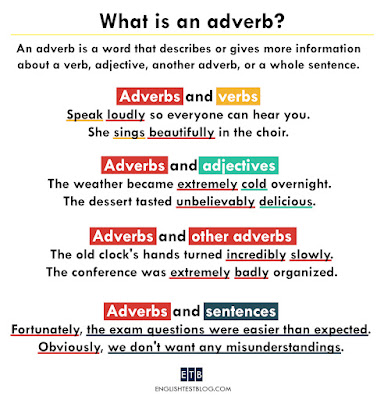Adverbs enhance the sentences by giving us more information. They make our language more precise and help us understand the details of an action or situation. Adverbs add depth to our communication by answering questions like "how?", "when?", "where?", and "to what extent?".
What is an adverb?
An adverb is a word that describes or gives more information about a verb, adjective, another adverb, or even a whole sentence. Many adverbs end in "-ly", but remember, not all adverbs follow this pattern. Some adverbs, like "fast" or "hard", don't end in "-ly".
Adverbs and verbs
- Speak loudly so everyone can hear you.
- She sings beautifully in the choir.
Adverbs and adjectives
- The weather became extremely cold overnight.
- The dessert tasted unbelievably delicious.
Adverbs and other adverbs
- The old clock's hands turned incredibly slowly.
- The conference was extremely badly organized.
Adverbs and sentences
- Fortunately, the exam questions were easier than expected.
- Obviously, we don't want any misunderstandings.
There are many different types of adverbs. Each one serves a unique purpose. Let's explore the types of adverbs to learn more about them.
Adverbs of time
Adverbs of time tell us when or for how long something happens. They give us information about the timing or duration of an event.
- I am busy now.
- I will finish my homework today.
- We have a meeting tomorrow.
Adverbs of frequency are adverbs of time that tell us how frequently something happens. They give us information about the regularity or frequency of an event.
- I always brush my teeth before bed.
- I often go for a walk in the evening.
- I never skip my morning routine.
- Come here and sit next to me.
- The cat is over there, near the window.
- I searched everywhere for my keys.
- The children played happily in the snow.
- She speaks English fluently.
- He completed the puzzle quickly.
- She is very happy.
- The weather is extremely hot.
- The movie was so interesting.
- He didn't study for the exam, and consequently, he failed.
- She's underage and therefore not eligible to vote.
- The storm damaged the roof, hence the need for urgent repairs.
- I only want a small piece of cake.
- There is just one method that suits everyone.
- She mostly wears casual clothes to work.
- Clearly, this will cost more than we anticipated.
- Not surprisingly, he was selected as the team captain.
- Apparently, it is going to be hot this weekend.
- In my opinion, it's a very sound investment.
- Personally, I don't believe it's true.
- In political terms, elections decide who runs the country.
- The weather was ideal for a picnic. However, they decided to stay indoors.
- She was cooking dinner. Meanwhile, he set the table.
- He excels in sports, and moreover, he is an excellent student.

Comments
Post a Comment